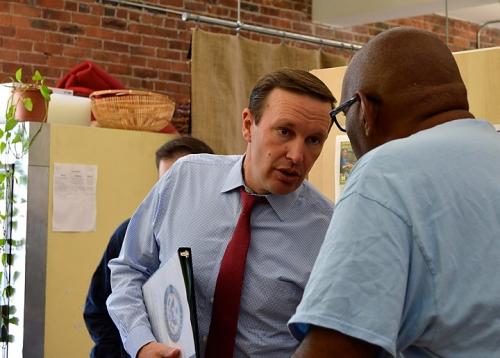
U.S. Sen. Chris Murphy encountered several New Haveners on food stamps during his “Walk Across Connecticut.” One day after finishing the walk, he promised to fight an effort to scale food stamps back.
Murphy Monday morning carried his conversations from the prior weekend to the CitySeed food policy organization on Grand Ave, where he met with approximately 30 local activists to discuss the SNAP program and his vow to urge the House to pass the Senate’s version of the Agricultural Improvement Act of 2018, also known as the Farm Bill — a proposal which mostly maintains current nutritional government programs through the next five years.
The House and the Senate have both passed different versions of the bill, and now have to reconcile them.
“I’m not jumping for joy over the Senate bill but given where we are today, I will take it. And I voted for it. The House bill is a different story,” said Murphy.
The Senate bill — which passed on June 28 in an 86-11 vote — would maintain the level of standing programs like Supplemental Nutrition Assistance Program, also known as SNAP or food stamps. The Senate version would encourage food stores to incentivize SNAP households to purchase more healthful foods and allow farmers to certify once for farmers’ markets instead of signing up individually among other added provisions.
The House passed its own version of the Farm Bill on June 21 by a slimmer two-vote margin. According to some estimates, the House’s version would result in two million people losing eligibility for food stamps partially through nationwide requirements that force individuals to recertify every 30 days that they are working. Exceptions include full disablement and caring for a child under six years of age. Individuals out of work for 90 days or more would lose eligibility for SNAP for the next year.
“It’s punitive. The people who voted for this bill in the House hate poor people so much that they decided to make you ineligible for food stamps for one to three years if you are out of work for a short period of time,” said Murphy.
Murphy said many residents require soup kitchens and SNAP to survive. He encountered one such New Havener, Tommy O’Neill, on the New Haven Green in the final stretch of his 70 mile “Walk Across Connecticut,” which he completed on Sunday.
After briefing the room at CitySeed, the senator turned the floor to the constituents sitting before him, many of who represent various activist groups around the area.

Witnesses to Hunger — an advocacy group focusing on the nutritional difficulties mothers of limited means face — had 13 attendees at Monday’s roundtable talk, including Melissa Driffin, a mother, college graduate and recovering substance abuser. She shifted the conversation to direct discussion of employment, sharing her difficulties in job attainment due to her record. She said she has a “red tape” barring her from hire.
 Merryl Eaton of Mothers for Justice, an advocacy group focused on welfare reform, pointed to the need for healthier lifestyles. She called for more research exploring the connection between poor health and higher healthcare and Medicaid costs.
Merryl Eaton of Mothers for Justice, an advocacy group focused on welfare reform, pointed to the need for healthier lifestyles. She called for more research exploring the connection between poor health and higher healthcare and Medicaid costs.
“If we talk about the sheer math of what happens when people are hungry, when they’re eating poor quality food, how healthcare costs go up,” said Eaton.
Mark Griffin of Focus Act Connect Everyday lives in the Dwight neighborhood. He said he regularly encounters mothers who cannot afford to meet nutrition needs of their family, not to mention sustain a healthy diet.
He said that a decrease in funding for programs like SNAP would be met with increased food theft in attempts to provide for families.
“With this problem, it’s going to turn into a bigger problem,” said Griffin.
by Carly Wanna